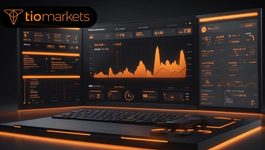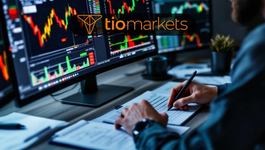ETCs Explained: What Are Exchange Traded Commodities? | TIOmarkets
BY TIOmarkets
|June 11, 2024Exchange Traded Commodities (ETCs) represent a pivotal innovation in the world of investment, offering a bridge between the commodities markets and the accessibility of exchange-traded funds (ETFs). This article delves into the essence of ETCs, their operational framework, and the unique opportunities they present to investors.
Understanding Exchange Traded Commodities
At their core, ETCs are financial instruments that provide investors with exposure to commodities, such as metals, energy, or agricultural products, without the need to physically hold the commodities. They are traded on stock exchanges, mirroring the price movements of the commodities they represent.
How ETCs Work
ETCs are structured as either physically backed or synthetic products. Physically backed ETCs hold the actual commodity in storage, while synthetic ETCs use derivatives to replicate the price movements of the underlying commodities. Both types aim to provide the performance of the commodity index they track.
Investors buy shares in ETCs much like they would with stocks, allowing for the ease of trading combined with the diversification benefits of commodities. This accessibility is one of the key attractions of ETCs, making commodities investment feasible for a broader audience.
Benefits of Investing in ETCs
ETCs offer several advantages, including liquidity, transparency, and a lower barrier to entry compared to direct commodities trading. They also provide a hedge against inflation and a means of portfolio diversification, as commodities often move independently of stocks and bonds.
Moreover, ETCs eliminate the challenges associated with physical commodities investments, such as storage costs and logistical complexities, making them an attractive option for individual and institutional investors alike.
Market Risk
Commodities markets can be highly volatile, influenced by factors such as geopolitical events, supply and demand dynamics, and changes in currency values. This volatility can lead to significant price fluctuations in ETCs, impacting their value.
Counterparty Risk
In the case of synthetic ETCs, there is a risk that the counterparty involved in the derivative contracts may fail to fulfill their obligations. This could potentially lead to losses for investors, highlighting the importance of due diligence when selecting ETCs.
Risks Associated with ETCs
While ETCs present an innovative investment avenue, they are not without risks. Understanding these risks is crucial for investors considering ETCs as part of their investment strategy.
Types of Commodities in ETCs
ETCs can cover a wide range of commodities, offering investors various sectors to choose from based on their investment goals and risk tolerance.
Precious Metals
Precious metals ETCs, such as those tracking gold, silver, and platinum, are popular choices for investors looking to hedge against inflation and currency devaluation. These ETCs often serve as a safe haven during times of economic uncertainty.
Energy Commodities
Energy commodities ETCs, including those focused on oil, natural gas, and coal, allow investors to gain exposure to the energy sector's dynamics. These ETCs can be influenced by changes in global energy policies, technological advancements, and shifts in supply and demand.
Agricultural Commodities
Agricultural commodities ETCs cover products like wheat, corn, and soybeans. These ETCs can be affected by factors such as weather conditions, crop yields, and changes in consumption patterns, offering a unique set of opportunities and risks.
Choosing the Right ETC
Selecting the appropriate ETC requires careful consideration of several factors, including the investor's financial goals, risk appetite, and the specific characteristics of the commodity market.
Assessing Risk and Return
Investors should evaluate the potential risks and returns associated with different commodities and consider how ETCs fit within their overall investment portfolio. Diversifying across various commodities can help mitigate risk.
Understanding Fees and Expenses
It's important to be aware of the fees and expenses associated with ETCs, as these can impact overall returns. Investors should compare the costs of different ETCs and consider the long-term implications of these expenses on their investment.
Additional Considerations for ETC Investments
When delving into the world of ETC investments, there are several additional factors to keep in mind to make informed decisions and maximize potential returns.
Regulatory Environment
Understanding the regulatory landscape surrounding ETCs is crucial for investors. Regulations can impact the structure, trading, and taxation of ETCs, influencing their overall performance and attractiveness as investment vehicles.
Global Economic Trends
Monitoring global economic trends is essential when investing in ETCs, as macroeconomic factors can significantly impact commodity prices. Factors such as interest rates, trade policies, and economic growth projections can all influence the performance of commodities and, by extension, ETCs.
Technological Advancements
The advancement of technology plays a significant role in the commodities market and ETC trading. Innovations in data analytics, trading platforms, and algorithmic trading can impact the efficiency and accessibility of ETC investments, shaping the landscape for investors.
Strategies for ETC Portfolio Management
Developing effective portfolio management strategies is essential for optimizing ETC investments and achieving long-term financial goals.
Diversification Techniques
Implementing diversification techniques within an ETC portfolio can help spread risk and enhance returns. By investing in a mix of commodities across different sectors and regions, investors can reduce the impact of volatility in any single market.
Monitoring Performance Metrics
Regularly monitoring performance metrics of ETCs is crucial for assessing investment success and making informed decisions. Metrics such as tracking error, expense ratios, and correlation with benchmark indices can provide valuable insights into the performance of ETC investments.
Rebalancing Strategies
Implementing disciplined rebalancing strategies can help maintain the desired asset allocation within an ETC portfolio. By periodically adjusting holdings based on market conditions and investment objectives, investors can ensure their portfolio remains aligned with their long-term goals.
Conclusion
Exchange Traded Commodities offer a compelling option for investors looking to diversify their portfolios and gain exposure to the commodities market. By understanding the workings, benefits, and risks of ETCs, investors can make informed decisions that align with their investment objectives. As with any investment, due diligence and a clear strategy are key to navigating the complexities of the commodities market through ETCs.
Start Trading Commodities with TIOmarkets
Ready to take your investment journey into the dynamic world of commodities? TIOmarkets, a top-rated forex broker, invites you to explore the vast opportunities within the commodities market. With over 170,000 accounts opened across more than 170 countries, our platform is designed to empower you. Trade over 300 instruments across 5 markets, including Forex, indices, stocks, and futures, all with low fees. Enhance your trading skills with our comprehensive educational resources and step-by-step guides. Take the first step towards diversifying your portfolio by creating a trading account today and unlock the potential of Exchange Traded Commodities.

Risk disclaimer: CFDs are complex instruments and come with a high risk of losing money rapidly due to leverage. You should consider whether you understand how CFDs work and whether you can afford to take the high risk of losing your money. Never deposit more than you are prepared to lose. Professional client’s losses can exceed their deposit. Please see our risk warning policy and seek independent professional advice if you do not fully understand. This information is not directed or intended for distribution to or use by residents of certain countries/jurisdictions including, but not limited to, USA & OFAC. The Company holds the right to alter the aforementioned list of countries at its own discretion.
Join us on social media

Behind every blog post lies the combined experience of the people working at TIOmarkets. We are a team of dedicated industry professionals and financial markets enthusiasts committed to providing you with trading education and financial markets commentary. Our goal is to help empower you with the knowledge you need to trade in the markets effectively.
Related Posts





